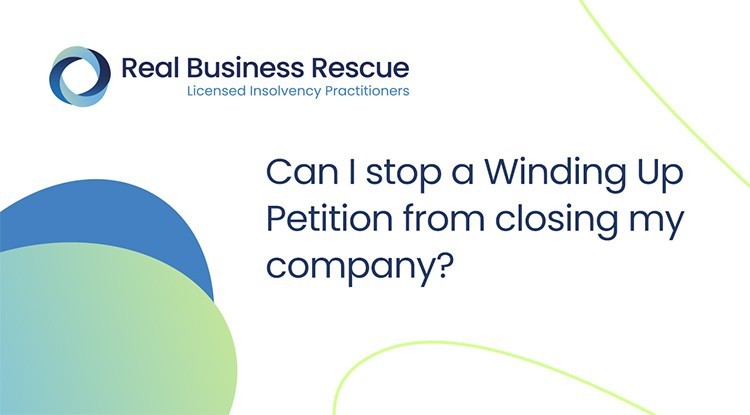
Understand your company's position and learn more about the options available
Require Immediate Support? Free Director Helpline: 0800 644 6080
Free Director Helpline: 0800 644 6080
Updated:
A winding up petition is an extremely serious statement of intent by a creditor in shutting down your company due to unpaid debts through the route of compulsory liquidation. It is the strongest action a creditor can take against your business and is often the natural next step in the debt chasing process after a statutory demand for payment has gone unheeded.
If your company is served with a winding up petition, it represents the most serious legal action a creditor can take. If nothing is done about it, the petition starts a series of events that disables your ability to trade, and ultimately means your company will be wound up.
It is imperative that you act quickly, as once the petition has been served you only have seven days before the company’s financial situation becomes public knowledge. The court sets a hearing date to decide whether a winding up order should be granted, and if so, the liquidation process begins.
Seeking advice and guidance from a licensed insolvency practitioner will ensure you understand all your options, the ultimate aim being to prevent the liquidation of your company.

60 Second Test Find Your Nearest Office

Receiving a winding up petition is an extremely serious event, and while this doesn't necessarily mean the company is doomed, you do need to take immediate action to arrest the situation before it gets any worse.
If a company is insolvent (defined by being unable to pay liabilities - such as invoices - as and when they fall due), being issued with a winding up petition by a creditor is effectively their last resort in trying to get paid. This form of action usually follows a series of unsuccessful attempts to recoup money using the standard methods of collection.
Many creditors will first issue a statutory demand against your company before opting to serve a WUP, although they do not have to do this. In order to petition for the winding up of your company, a creditor must be owed a debt of £750 or more.
When a creditor issues a petition for winding up, this will need to be advertised in the London Gazette. This means that your bank and other creditors are likely to become aware of the situation immediately. In order to protect their own interests, the bank will often freeze your company bank accounts, rendering trade impossible.


Get an instant understanding of your:
Plus much more ...
Start The 60 Second Test
If one of your creditors is owed £750 or more, the debt is not in dispute, and they have unsuccessfully tried to recover the debt via standard channels, they can issue a winding up petition with a view to closing down your company.
They must be able to prove that the debt exists, and this is usually done via a 21-day statutory demand for payment issued prior to the winding up petition. Failing to pay the statutory demand makes the debt exist in law, and also can be used as evidence that your company is in fact insolvent and unable to meet its financial obligations.
Trade suppliers, HMRC and the banks commonly issue winding up petitions, with HMRC in particular being known to use this method as a way to recover debt quickly.
The cost to the petitioner is significant, however, and so a creditor typically regards this as the only course of action left open to them. Court fees are high, and when added to the cost of hiring legal assistance, the process is expensive for the petitioning party – usually falling between £1,500 and £2,000. Due to this, it is rarely done unless all other efforts to collect the money owed have been exhausted.
Now you know what a winding up petition is and why you may have been served with one, you may be wondering what happens once a petition has been issued and served on your company?
The court sets a date for the hearing, and a decision is made on whether to grant a winding-up order. If an order is granted, the Official Receiver (OR) or another liquidator will be appointed to forcibly wind up the company, place it into compulsory liquidation, and sell its assets for the benefit of your creditors. They will also investigate the conduct of directors in the time preceding insolvency.
All company assets will be professionally valued with a view to selling them at a liquidation auction, and the proceeds distributed equitably between creditor groups. The company is then removed from the Register of Companies at Companies House, and will cease to exist.
Mounting creditor pressure?
If your creditors are growing increasingly impatient, it is time to take action. Ignoring the situation is only likely to make it worse. Take the first step today by contacting Real Business Rescue for immediate help and advice.
The team are available now - 0800 644 6080
It is a statutory requirement that, to obtain a winding up order, all petitions are advertised in the London Gazette, which effectively alerts the public and other creditors to your situation. The banks scan these adverts regularly to protect their own interests, and it generally doesn’t take long for news to spread about a company experiencing financial trouble.
The advert is usually placed in the Gazette seven days after the petition has been served. This quickly escalates the seriousness of your position, and considerably reduces your ability to save the company.
As far as the courts are concerned the company’s potential winding up begins when the petition is presented, making any movement of company assets after this time recoverable by the liquidator if a winding up order is later granted under Section 127 of the Insolvency Act 1986.
It is advisable to act only on the guidance of an insolvency practitioner under these circumstances, to avoid any unlawful transactions or movement of assets that could result in personal liability later on.
You may have heard of a winding up petition being presented on ‘just and equitable grounds,’ but this refers to a different type of petition than those presented by creditors claiming insolvency.
If there is a shareholder dispute – for example, a deadlock on decisions in the boardroom or a shareholder who believes the company is being mismanaged - they may be able to take action using this type of petition. A company may also be wound up on 'just and equitable' grounds in a matter of public interest.
Can’t pay CBILS or Bounce Back Loan?
Don't worry - there are thousands of other company directors in the same position. If you are struggling to keep up with your Covid loan repayments, speak to a member of the Real Business Rescue team to discuss your options. It's Free & Confidential.
The team are available now - 0800 644 6080
A winding up order is the court order that forces an insolvent company into compulsory liquidation – a process in which the court appoints an Official Receiver (OR) to liquidate all of the company’s assets in order to repay creditors.
Once the court has granted a winding up order, the Official Receiver or another liquidator will be appointed to close down the business. They will analyse your company’s affairs and assets with a view to having them professionally valued prior to their sale at auction.
Once all business assets have been realised, the liquidator will make distributions to your creditors according to their position in the repayment ‘hierarchy.’ When this is complete, the company is struck off the register at Companies House and will cease to exist.
During a compulsory liquidation procedure, the liquidator also has a duty to investigate the conduct of all directors and shadow directors during the time leading up to insolvency. They will want to interview you and your co-directors, and try to establish what led the company's declining financial position.
Even though you enjoy limited liability as a director of the company, in certain circumstances you and other directors may be held personally liable for some or all of the company’s debts.
Under insolvency law, a company must cease to trade as soon as directors are aware that it is insolvent, or is likely to be insolvent in the near future. By being issued with a winding up petition, this can be seen as you continuing to trade past the point of insolvency.
By consulting with an insolvency practitioner as soon as you’re issued with a winding up petition, you can receive valuable guidance and learn how to record the actions of your company to show the court that the directors fulfilled their duties while trading insolvent.
If your company is struggling with unmanageable debts, squeezed cash flow, or an uncertain future, you are far from alone. We speak to company directors just like you every single day, and we are here to give you the help and advice you need.
Call our team today on 0800 644 6080
Still unsure whether liquidation is right for your company? Don't worry, the experts at Real Business Rescue are here to help. Our licensed insolvency practitioners will take the time to understand the problems your company is facing before recommending the best course of action going forward based on your own unique circumstances.

Complete the below to get in touch
For Ltd Company Directors
Get An Instant Understanding Of Your:
Plus much more ...
We provide free confidential advice with absolutely no obligation.
Our expert and non-judgemental team are ready to assist directors and stakeholders today.

Understand your company's position and learn more about the options available

Find your nearest office - we have more than 100 across the UK. Remote Video Meetings are also available.

Free, confidential, and trusted advice for company directors across the UK.